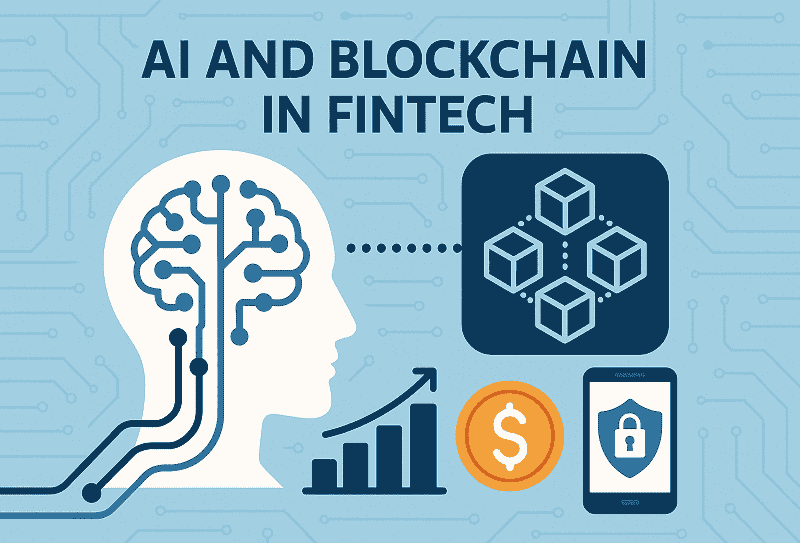The financial technology (fintech) sector is undergoing a seismic shift, driven by two of the most transformative technologies of our time artificial intelligence (AI) and blockchain. These innovations are not just enhancing existing financial systems but are fundamentally redefining how money is managed, invested, and secured.
In 2025, AI and blockchain are no longer experimental concepts confined to tech labs; they are now integral to banking, payments, lending, and even regulatory compliance. This article explores how these technologies are revolutionizing fintech, the challenges they face, and what the future holds for this rapidly evolving industry.
The Rise of AI in Fintech
Artificial intelligence has become a cornerstone of modern fintech, enabling smarter, faster, and more personalized financial services. Unlike traditional banking systems that rely on manual processes, AI automates decision-making, reduces human error, and enhances efficiency across multiple domains.
One of the most visible applications of AI in fintech is customer service automation. Banks and fintech firms now deploy AI-powered chatbots and virtual assistants to handle millions of customer interactions daily. Bank of America’s Erica, for instance, assists users with balance inquiries, fraud alerts, and even personalized financial advice. Studies show that AI-driven customer service reduces operational costs by up to 30% while improving response times.
Beyond customer support, AI is revolutionizing fraud detection and risk management. Traditional fraud prevention systems rely on predefined rules, making them slow and reactive. In contrast, machine learning algorithms analyze vast amounts of transaction data in real-time, identifying suspicious patterns before fraud occurs. Companies like Feedzai and Darktrace use AI to detect anomalies, reducing financial fraud by nearly 40% in some cases.
Investment and trading have also been transformed by AI. Algorithmic trading, powered by AI, now accounts for over 60% of stock market activity. Hedge funds and robo-advisors such as Betterment and Wealthfront use predictive analytics to optimize portfolios, often outperforming human traders. High-frequency trading (HFT) firms leverage AI to execute millions of micro-trades per second, capitalizing on minute market fluctuations.
Perhaps one of the most socially impactful uses of AI in fintech is in credit scoring and lending. Traditional credit systems exclude millions of people due to rigid scoring models. Fintech lenders like Upstart and Affirm use AI to analyze alternative data such as rent payments, education history, and even social media behavior to assess creditworthiness. This approach has expanded financial access to underbanked populations, proving that AI can be both profitable and inclusive.
Blockchain’s Disruptive Role in Finance
While AI enhances efficiency, blockchain is redefining trust and transparency in financial systems. Originally developed as the technology behind Bitcoin, blockchain has evolved into a foundational layer for decentralized finance (DeFi), smart contracts, and even government-backed digital currencies.
Decentralized Finance (DeFi) is perhaps the most groundbreaking application of blockchain in fintech. Unlike traditional banking, which relies on intermediaries like banks and brokers, DeFi platforms operate on open, permissionless blockchains. Ethereum, Solana, and Cardano host a variety of DeFi protocols that allow users to lend, borrow, and earn interest all without a central authority. The total value locked (TVL) in DeFi has surged past $80 billion, signaling growing mainstream adoption.
Another revolutionary blockchain innovation is the smart contract self-executing agreements that automatically enforce terms when predefined conditions are met. Industries ranging from insurance to real estate are adopting smart contracts to eliminate paperwork and reduce fraud. For example, Chainlink provides decentralized oracles that feed real-world data into smart contracts, enabling use cases like parametric insurance and automated supply chain payments.
Governments are also embracing blockchain through Central Bank Digital Currencies (CBDCs). Over 130 countries are currently exploring CBDCs, with China’s digital yuan leading the charge. These digital currencies promise faster transactions, reduced fraud, and greater financial inclusion. Some experts believe CBDCs could eventually replace physical cash altogether.
Cross-border payments, long plagued by high fees and slow processing times, are also being disrupted by blockchain. Companies like Ripple (XRP) and Stellar (XLM) enable near-instant international transfers at a fraction of traditional banking costs. MoneyGram, for instance, uses Ripple’s technology to settle transactions in seconds, demonstrating blockchain’s potential to revolutionize remittances.
The Powerful Synergy Between AI and Blockchain
While AI and blockchain are powerful individually, their convergence is unlocking even greater possibilities. AI enhances blockchain’s capabilities in security, analytics, and automation, while blockchain provides AI with transparent, tamper-proof data.
One of the most critical applications of this synergy is in fraud prevention. AI-powered analytics tools like Elliptic and Chainalysis monitor blockchain transactions in real-time, flagging suspicious activity such as money laundering or ransomware payments. Meanwhile, AI-driven predictive models can identify potential rug pulls and Ponzi schemes in DeFi before they cause widespread damage.
Crypto trading is another area where AI and blockchain intersect. AI-powered trading bots
such as those offered by 3Commas and Bitsgap analyze market trends, news sentiment, and whale movements to execute profitable trades autonomously. These bots outperform human traders by processing vast amounts of data in milliseconds.
Regulatory compliance, often a bottleneck in fintech, is also benefiting from this convergence. AI can scan blockchain ledgers for illicit transactions while preserving user privacy a crucial feature for anti-money laundering (AML) and know-your-customer (KYC) compliance. Firms like ComplyAdvantage use AI to help financial institutions navigate complex regulations without sacrificing efficiency.
Challenges and Risks in AI and Blockchain Adoption
Despite their promise, AI and blockchain face significant hurdles that could slow their adoption.
AI’s Ethical and Bias Concerns
AI models are only as good as the data they’re trained on. If historical financial data contains biases such as discrimination against certain demographics AI can perpetuate these inequalities. Cases of AI denying loans or charging higher interest rates based on biased algorithms have already sparked regulatory scrutiny. Ensuring fair and transparent AI is a major challenge for fintech firms.
Blockchain’s Scalability Issues
While blockchain offers decentralization and security, it often struggles with speed and cost. Ethereum’s network congestion leads to high gas fees, while Bitcoin’s slow transaction times make it impractical for everyday payments. Solutions like Layer 2 scaling (Polygon, Arbitrum) and sharding are being developed, but widespread adoption remains a work in progress.
Regulatory Uncertainty
Governments worldwide are still grappling with how to regulate AI and blockchain. The SEC’s lawsuit against Ripple over XRP’s classification as a security highlights the legal ambiguities surrounding crypto. Similarly, AI-driven financial products face scrutiny over accountability who is responsible if an AI makes a faulty trading decision? Clearer regulations are needed to foster innovation while protecting consumers.
The Future of Fintech: What’s Next?
Looking ahead, AI and blockchain will continue to push fintech into uncharted territory.
- AI-Managed DAOs: Decentralized Autonomous Organizations (DAOs) could soon be governed by AI, making real-time decisions without human intervention.
- Quantum Computing: While quantum computers threaten to break blockchain encryption, they could also enhance AI’s predictive power, creating a new arms race in fintech security.
- Tokenization of Assets: Everything from stocks to real estate could be tokenized and traded on blockchain platforms, democratizing access to high-value investments.
Conclusion
AI and blockchain are not just shaping the future of fintech they are defining it. From AI-powered banking assistants to decentralized financial ecosystems, these technologies are making finance faster, more secure, and more inclusive. However, challenges like bias, scalability, and regulation must be addressed to unlock their full potential.
As we move further into 2025, one thing is clear: fintech companies that ignore AI and blockchain risk being left behind. The question is no longer if these technologies will dominate finance, but how quickly they will do so.
What do you think? Will AI and blockchain make finance more equitable, or will they introduce new risks? Share your thoughts in the comments!
For more visit : blogsinsider.site



